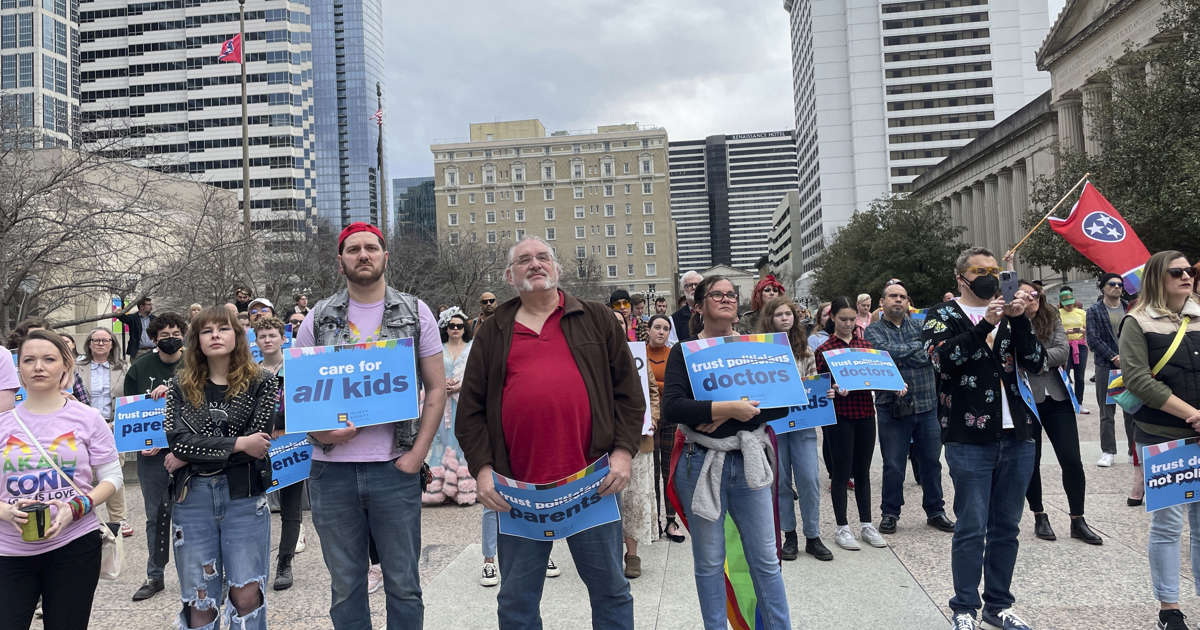[ad_1]
© Jonathan Mattise/AP
Advocates gather for a rally at the state Capitol complex in Nashville to oppose several bills that target the LGBTQ community on Feb. 14.
Tennessee Gov. Bill Lee (R) said he intends to sign a controversial bill restricting where drag shows can take place in the state — the latest effort by Republican legislators across the country to target the performances amid broader backlash to expanded LGBTQ rights.
Tennessee’s House and Senate voted to make it illegal for anyone to engage in “adult cabaret” performances on public property or in a place where children might see them — claiming these practices may be harmful to children.
Lawmakers called out “topless dancers, go-go dancers, exotic dancers, strippers, male or female impersonators” who provide entertainment of an overly sexual nature. Broad language — restricting performances by these “or similar entertainers, regardless of whether or not performed for consideration” — has sparked fears in the LGBTQ community of a broad crackdown on drag performers, including in settings such as Pride parades.
Tennessee lawmakers also passed a separate bill earlier in February banning gender-affirming care for most trans minors.
“I intend to sign both of them,” Lee said, referring to the bills in a news conference on Monday.
The bill would be one of at least 26 introduced nationwide in the current legislative session by Republicans seeking to impose restrictions or conditions on drag events, as The Washington Post has reported.
Lee on Monday did not directly answer when asked if he knew of any specific incidents relating to drag shows that enacting this bill would solve.
“I think that the concern is what’s right there in that … building,” he said, gesturing toward the Dr. William Burrus Elementary School in Hendersonville, Tenn., where he was speaking to journalists. “Children that are potentially exposed to sexualized entertainment, to obscenity, and we need to make sure that they’re not.”
Lee also addressed a yearbook photo circulating online and appearing to show him in high school in 1977, dressed up as a woman. The photo prompted some local Democratic politicians and activists to accuse the governor of having a double standard.
Utah banned gender-affirming care for trans kids. What does that mean?
Lee, who was asked whether he remembered “dressing in drag in 1977,” said it would be “ridiculous” to conflate “something like that to sexualized entertainment in front of children.”
Lee’s office did not immediately respond to requests for further comment early Tuesday.
Jade Byers, a spokesperson for Lee, told the Tennessean in a statement that the bill restricting drag shows “specifically protects children from obscene, sexualized entertainment, and any attempt to conflate this serious issue with lighthearted school traditions is dishonest and disrespectful to Tennessee families.”
GOP targets drag shows with new bills in at least 14 states
The two chambers will have to reconcile their bills before sending the final version to Lee’s desk, according to the Tennessean.
A first violation of this law would be considered a Class A misdemeanor, which carries a maximum prison sentence of 11 months and 29 days and/or a maximum fine $2,500. Any further violation would be classified as a Class E felony, which could come with a prison term of between one and six years, and a fine of up to $3,000.
Montgomery police to patrol drag story hours after Proud Boys protest
Opponents argue that the bill discriminates against drag performers by signaling without evidence that drag shows — which can run the gamut from sexually explicit to family-friendly — may be harmful to children.
“The dangerous practice of banning LGBTQ+ events, spaces, and culture — including drag performances — is part of a large-scale attack on the LGBTQ+ community,” the Human Rights Campaign said in a statement. The advocacy group called the Tennessee bill an attempt to label LGBTQ+ people “as dangerous.”
The ACLU, in a statement about a separate bill under consideration by state lawmakers that would require “adult cabaret” performers to obtain a permit and ban minors from attending these performances, said that limiting drag performers’ expression violates their constitutional rights.
“Dance, fashion, and music — essential components of a drag performance — are all protected by the First Amendment. Yet, these laws are written so broadly and vaguely that they would allow government officials to censor performers based on their own subjective viewpoints of what they deem appropriate on any given day,” the group said.
UP NEXT
Proponents say drag performances are not appropriate for minors. Initiatives such as Drag Story Hour, in which drag performers read books to children in libraries and schools, have become a particular focus of controversy.
In Tennessee, the bill’s backers say they are not seeking to ban drag shows but rather limit children’s exposure to them. “I’m not trying to take away anyone’s First Amendment rights,” state Sen. Jack Johnson (R), who introduced the bill in November, previously told The Post. “But you should be able to take your kids to a public park or library and not be surprised by seeing sexually explicit entertainment taking place.”
‘Our state is at war with our family’: Clergy with trans kids fight back
Kimberly Kindy contributed to this report.
[ad_2]

